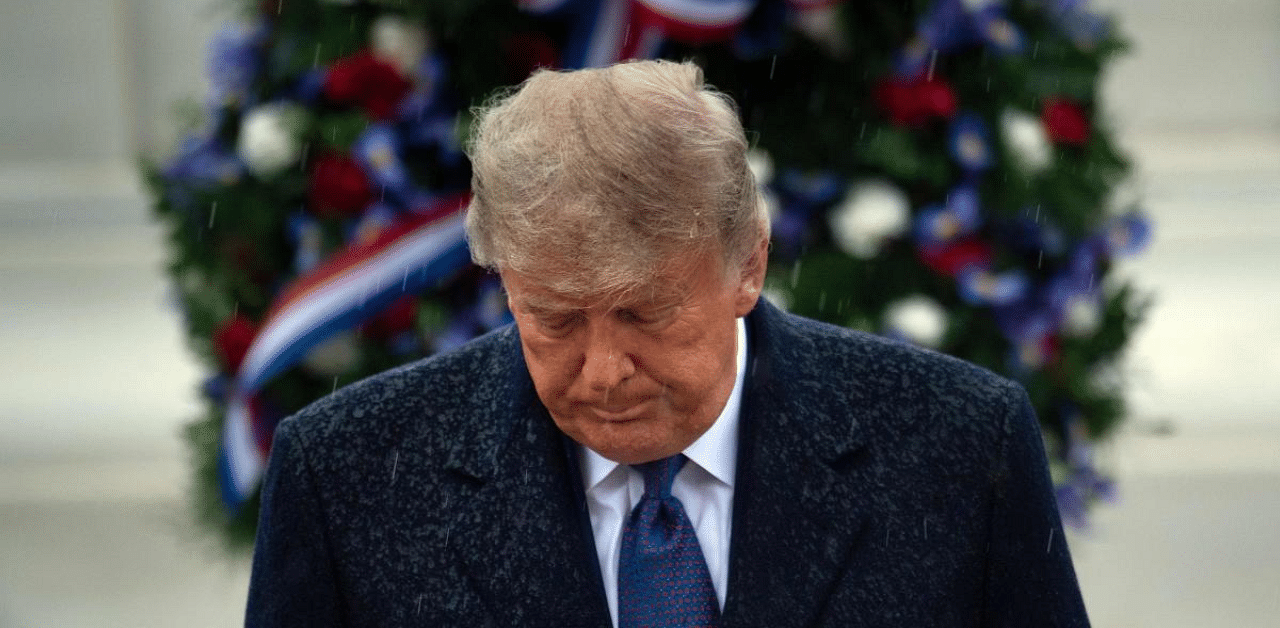
Five days after television networks and other major news organizations called the presidential election for Joe Biden, President Donald Trump continues to maintain that he “will win.”
That is false.
Biden’s winning margins in the key battleground states he has captured — 20,000 votes in Wisconsin, 54,000 votes in Pennsylvania and 148,000 votes in Michigan — are well above the thresholds of votes that have been changed in previous recounts.
Even in Georgia, where officials are preparing for a hand recount of the ballots, Biden leads by 14,000 votes, a margin that is unlikely to be reversed.
(Biden also leads by 11,000 votes in Arizona, but elections officials there are still counting absentee votes that arrived by mail.)
The New York Times and other news media outlets have not anointed Biden the winner of the presidential election but have just done the math: The former vice president has won enough states by enough votes that Trump cannot overcome those deficits through legal challenges or recounts.
“He has no chance of overturning the result — it’s just impossible,” said Gerry McDonough, a Democratic elections lawyer who worked for Vice President Al Gore’s legal team on the 2000 Florida recount. “I’m a recount lawyer here in Massachusetts and I get requests from people all the time and they say, ‘I’m just 50 votes behind and we’re sure there were these bad actors.’ I won’t take a case like that.”
That 2000 Florida recount came after George W. Bush held an unofficial lead of just 1,784 votes over Gore the morning after Election Day; his final winning margin in the state was 537 votes.
The largest margin to be overturned in a recent recount came in Minnesota’s 2008 Senate contest, when a 215-vote margin for Sen. Norm Coleman, the incumbent Republican, was reversed, becoming a 312-vote advantage for Al Franken, the Democratic candidate, after a court ruled that hundreds of absentee ballots were wrongly rejected.
In the days since the election, Trump and his top aides and some supporters have claimed that the vote in key states was marked by rampant fraud, but they have yet to document any evidence of widespread voting malfeasance. Elections officials in all 50 states told The New York Times this week that they were unaware of any fraud or other election improprieties in their states.
Each day that passes without Trump providing a court evidence of voting fraud makes his legal odds longer, Democratic and Republican lawyers said.
“The path for him winning is being able to back up his rhetoric and find sufficient fraud and irregularities in enough individual states to overturn their results,” said Ben Ginsberg, a Republican lawyer who worked for Bush in the 2000 election, and who retired this year and turned against Trump. “So far, they’ve utterly failed to do that and, based on their court filings, are not anywhere close.”
With no chance to change the popular vote outcome in battleground states, lawyers said Trump’s legal strategy, such as there is one, appeared to be an attempt to delay state elections officials’ certification of Biden as the winner, which could throw the question of appointing members of the Electoral College to Republican-controlled state legislatures.
Also read: Can Donald Trump block Joe Biden's victory?
Even this theory relies on a series of one-in-a-hundred legal bank shots all being successful in multiple states simultaneously — which would certainly result in broad public outrage over reversing the results of a decided election.
“Those are the kind of things you wake up thinking about in the middle of the night. It would really blow the roof off if they tried to steal an election in that fashion,” McDonough said. “If people were to so blatantly disregard the fundamentals of democracy, God knows what would happen, how people would react to it.”
Most states are set to certify their election results and declare winners by the end of November — a process that may lead to more official recounts this month but also formal conclusions about the results.
“At some point it becomes obvious even to the most ardent supporters of the president that there’s no pathway,” said Lanhee Chen, who was the policy director for Mitt Romney’s 2012 presidential campaign.